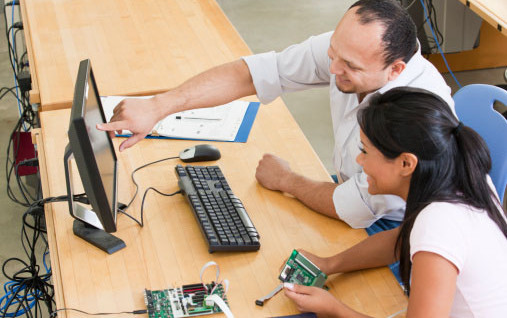ACC Teams Up to Create Unique Business Partnership
By Rebecca L. Weber
July 24, 2014
Texas-based community college works with local employers to create workforce opportunities on new campus.
Community colleges are committed to improving career opportunities for students. But that doesn’t mean they have to do this work on their own. As has become increasingly clear, some of the best job-training programs are formed through a shared responsibility with industry partners.
That’s the hope at Austin Community College (ACC) in Texas, where administrators are in negotiations with hosting company Rackspace to bring 570 of the company’s employees to an office on campus.
The pending partnership is one of several new initiatives underway on the college’s Highland campus to create opportunities for students in high-demand career fields, from technology to health sciences.
The ACCelerator, a high-tech learning lab with more than 600 computer stations, is another.
“We know that if we can figure out how to provide more, the students will be there,” says Neil Vickers, vice president of finance and budget at ACC.
Housed in a former shopping mall, the Highland campus is a 1.2 million square foot work in progress.
A portion of the new campus opens in August — 6,000 students are expected to make use of it during the first phase. But administrators wanted an employer presence to bring energy and opportunity to the project.
ACC put out a request for proposals, and were impressed by Rackspace’s vision for revamping a 40-year-old former Dillard’s convenience store in a manner consistent with the college’s mission.
Rackspace already has a strong presence in Austin, where it is known as an industry leader and reputable employer. Upscaling malls is not new to the company, either. The employer’s San Antonio headquarters, dubbed “the Castle” by employees, is located at a former shopping mall.
Valued expertise
But for ACC, the draw in working with a company like Rackspace is what it can bring to education.
“They can help use see what the emerging technologies in the industry are, the cutting-edge programming languages,” says Vickers. “They’ve already got industry experts, and we can use that to develop our own program.”
Administrators envision creating a better pipeline for employment, with ACC providing continuing professional development for Rackspace.
Pooling resources with businesses has been a winning strategy for the college in the past. For one, because it reduces the reliance on public funds as means to get things done. In the 1990s, ACC students worked with industry to build a semiconductor. Business partners provided the facilities and the college contributed instructional expertise.
Administrators say the possibility of hosting Rackspace on the physical campus presents unique opportunities for students. “Even those not in the paid internships will have the opportunity to have experiences with the industry just because the programs are co-located,” says Vickers, who adds, “There’s a broader synergy that can benefit all of the students in those programs.”
Rackspace suggests an aggressive schedule: If all goes according to plan, construction would begin this year, with employees relocating by the end of 2015.
If student demand is a barometer, the new relationship can’t come soon enough. “We feel strongly that the demand for this is already there for these types of programs,” says Vickers.
Does your college have an innovative public-private partnership? Tell us about it in the comments.








